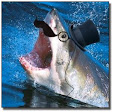Blame my father for making me a James Bond fan. He owned all the movies, and ever since he was a kid he'd been a big fan. If it wasn't for him owning the movies, I'd have thought that 007 was a rather neat video game character, instead of a cinematic icon of suavity and danger. And if it wasn't for the films, I'd have never taken enough interest to start collecting and reading the Bond books over the years, which would have meant I'd missed out on being introduced to Ian Fleming's sterling prose. Which would mean that I wouldn't be able to tell the difference between the quality of this book versus the previous attempt at resurrecting Bond, Devil May Care, as compared to the Fleming texts.
Devil May Care was a disaster. A formulaic fill in the numbers "tribute" to Ian Fleming's writing, that failed to capture me the way Fleming himself did upon the first read. Truthfully, the only reason I own the book is for completion sake. When I heard Carte Blanche was coming up, I seized the opportunity because I figured that if it was good, my faith would be restored. (And if it was bad, then I'd have a good time writing a negatively scathing review.) I am happy to announce that Carte Blanche succeeds in rebooting the franchise, and giving us readers something to look forward to. James Bond truly is back.
Bond, now a veteran of the war in Afghanistan, is a young 00 agent at the Overseas Development Group (ODG for short), a front for an organization loosely connected to MI6. If Six needs something done, but has its hands tied with the regulations, the ODG's O-Section goes to work with their carte blanche privileges. So long as it's overseas, it's theirs to do whatever they need to in order to get the job done. It is with this directive that our favorite agent of mystery and intrigue hops the globe in order to avert a disaster only known as Incident Twenty. It's set to happen in five days time, and James Bond will not only have to outsmart the enemy, but also bureaucratic hurdles within his own government, to stop the man who's at the head of it all...recycling magnate Severin Hydt.
This is the first Deaver book I've read and honestly after reading what he did with Bond, I ran out and picked up a copy of his other recent release, Edge. He knows his British slang enough to be convincing, he knows the economy of story masterfully enough to keep the book moving at a thrilling pace, and he knows the Bond formula enough to stay true when he has to and to innovate when the audience wants to. Literally, reading the last chapter of the book there was a moment I was afraid he'd sink into a typical Bond moment...and he didn't. He is obviously a fan of the new, gritty Bond reboot films...which also means he is a true Ian Fleming fan. What's even more impressive is that for an initial installment of a series reboot, Deaver forgoes the typical style of front-loading set-up and short changing actual action. As far as events are concerned, this reads more like an entry that confidentially trusts its audience knows the world enough that it doesn't have to hold their hand and introduce them to everyone. It lets them work the room and make its own introductions. It's a Bond book written by a Bond author.
It's rare that I gush over a book this much. Usually it's in the middle, with a couple quibbles here and there. Frankly, I can't think of any quibbles with this book at the moment. I think it's because the Bond formula is so comfortable that it's ok to follow it. However, in order for it to truly work, you need to put your own spin on it. Deaver does just that, and he does it admirably. If there's justice in the world of Spies, Simon and Schuster will continue to produce Bond novels with Deaver at the helm. Here's hoping that as always...
James Bond Will Return
Up Next: The Magician King by Lev Grossman



